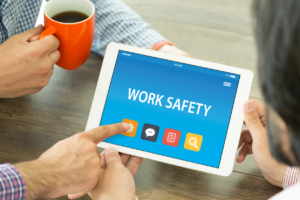March 4, 2025
Work injuries 101: Reporting injuries and supporting workers
No one starts out their day expecting a work injury.
On-the-job injuries are unanticipated, urgent and unfortunate for everyone involved, but there are best practices you can follow to make a bad situation better for you and your injured employee.
When to report work injuries
One key step is to report any work injury as soon as you can. Reporting immediately helps workers’ compensation claims go more smoothly for a number of reasons, including:
- Employees get any needed care right away
- Workers’ compensation benefits are paid promptly
- The carrier has time to review and submit the injury to the state
To make this happen, employees and their supervisors must be trained to identify work injuries and report them immediately. If a supervisor sees an injury occur, or hears about it in another way, in many states the employer is required to report the injury. This is true even if an employee does not formally report a work injury, in most states. In South Dakota, employees are required to report injuries to their employers within a specified time period.
We recommend reporting all work injuries, even if they are so minor they do not require medical attention. This way if the injury worsens over time and does lead to a doctor visit or time off, you will have captured information needed to manage the claim.
Reporting incident-only work injuries (injuries which do not lead to medical or lost-time expenses) does not impact your experience modification factor (e-mod).
How to report work injuries
When you’re ready to report an injury to SFM you have a number of options, but the two most common methods are by phone and online.
You can call the SFM Work Injury Hotline anytime at (855) 675-3501 to report work injuries. Here are a few tips for reporting via the hotline:
- We now offer a streamlined report-only option during business hours (7 a.m. – 4 p.m., M-F) for situations where the employee does not need to speak with a nurse. We recommend choosing the nurse option when the employee is unsure whether to seek medical treatment. (Calls outside of normal business hours will automatically go to a nurse.)
- If a supervisor is not available, an employee can call the SFM Work Injury Hotline alone.
- If the employee has already received medical treatment or is not available for the call, we recommend choosing the report-only option (Option 1) during business hours.
You can also report online on our website (sfmic.com) anytime. You do not need to log in to report injuries online. You just need your policy number. This is a fast and easy choice. Many employers opt to report online in cases where the worker has already received medical care.
For more information on reporting injuries, visit sfmic.com/report and download a copy of our claim packet.
Understanding the injury
After a work injury occurs, it’s important to figure out what happened and what you can do to prevent similar injuries in the future.
You can analyze a work injury in four steps:
- Collect data: Talk to witnesses, take pictures and review maintenance and training records.
- Identify the causes: Determine whether equipment, risky behavior, inadequate training, lack of personal protective equipment, the work environment, or other factors were to blame in causing the injury.
- Analyze the findings: Examine all the facts and distinguish between the immediate causes (such as a broken ladder rung) and underlying causes (such as lack of training).
- Develop a plan: Identify the steps to prevent similar injuries in the future.
For more information on accident analysis and a worksheet to guide you through the process, download our Accident analysis CompTalk from the resource catalog on sfmic.com.
Return to work
When employees are off work due to on-the-job injuries, it’s important to show concern right away and stay in contact until the employee returns to work. When employers don’t reach out, employees can feel isolated and worry that they will not have a job to return to.
We recommend bringing employees back to work as soon as possible, even if you have to modify their regular job or provide light-duty work to accommodate medical restrictions. Bringing employees back to work as soon as you can helps them:
- Recover faster
- Stay in the routine of working
- Feel productive
- Maintain workplace relationships
This also helps keep wage-loss benefits down, which helps limit the impact of the injury on your future workers’ compensation premiums.
Work injuries are better prevented, but when they do occur, your SFM team is here to help. Your claims representative is always available to guide you through the process and answer any questions. You can also find more resources in the Employers section of sfmic.com.





